Vax Motivators: A WWII Survivor Shares Her Story
Vaccinate Your Family’s Communications Intern, Allison Howells, interviewed her grandmother, Beth, who remembers life before most vaccines. Beth was born in Wales during World War II to a father who was the local doctor. Her memory of childhood diseases that are now preventable through vaccines motivates her to stay up to date on vaccinations as an older adult. Read their conversation below.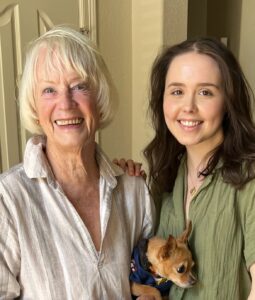
How would you describe your early childhood?
Very pleasant. I played around the house, and we had a lot of animals, so I played with the dogs. There was one other little girl on my street and occasionally I’d play with her. I learned to read by the time I was four and I went to the local elementary school when I was about five.
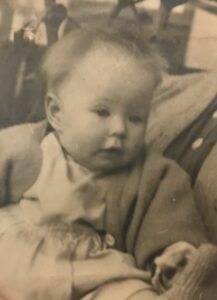
Beth at eight months old in 1942.
When I was born, my parents were quite elderly. My mother was 45 and my father was 65. I was born in the middle of World War II, in 1941, six months before Pearl Harbor. I had three brothers and three sisters. Everyone had hobbies, so I spent my time reading, knitting, and listening to the radio because there was no television or anything like that.
What was life like in Wales in the UK?
Everywhere you went, you walked. I didn’t live in rural Wales, I lived in a small city, but I still walked a lot. I walked to the library, I walked to school, you just walked everywhere. My father and brothers built a cottage in the country—that was very rural. It was in a Welsh valley and there was no electricity or running water. It was like going to live in the past, and there, you really walked a long way. It was very hilly so riding a bike was impossible. Most of the transportation was horseback or traps—Americans would call them “buggies.”
Food was exceptionally scarce during the war. I had a ration card given to me by the government that allowed my mom to get concentrated orange juice and cod liver oil once a month, so I wouldn’t be malnourished. Everyone was encouraged to produce their own food, so my father had the whole yard dug up and planted with vegetables. We also had apple trees and kept bees. There was no sugar, very little cheese, and very little meat. The first time I saw a banana I was about six years old, because those foods weren’t available during the war.
There must’ve been serious deficiencies in the general diet. I’m sure that if the Americans hadn’t entered the war, we would’ve starved.
Your father was a doctor, and two of your siblings were doctors as well. What was it like growing up in a family that had extensive medical experience?
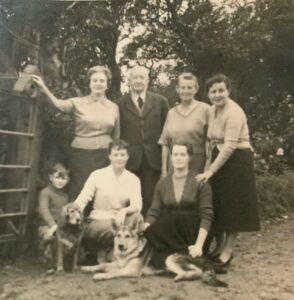
Beth (front row, center), with her eldest sister (back row, far left), and father (back row, second from left).
My father was a military surgeon in World War I. He worked in London and his patients were the wounded from the trenches. He was there for four years, and when he finished, he decided to go back to Wales to practice. He became a doctor of general medicine, did surgery, and took after ladies with babies. He practiced with four other doctors and they looked after the workers at the local steel plant.
My father really believed in education so my eldest sister was a doctor and one of my brothers was a doctor. They naturally married other doctors, so you’d sit at the kitchen table and there’d be four or five other doctors there. Cuts and bruises they dismissed as nothing because they were into big-time surgery and that kind of stuff. If we had chicken, it wasn’t carved—it was dissected.
People used to come to the house when they were sick or had injuries when I was a kid because everyone knew the doctor lived there. If someone had a broken arm, my father would put wooden splints on at home and then send them off so that they could have casts put on. I’d hold the bandages and stuff like that.
There were limited vaccines available for children and adults in the UK when you were growing up. Do you remember being sick as a young child?
Yes, I had everything: chicken pox, measles, German measles, I think I had scarlet fever. And of course, mumps. I know I had whooping cough. I must’ve caught it at school when I first went there. My sister was a doctor and when she heard me whooping when I coughed, she dropped everything in a panic because she recognized the sound. She had a baby in the house and so for the baby, whooping cough was a life-threatening illness. The baby was probably a couple of months old. That was a great drama.
I remember being very sick with something, maybe it was measles or scarlet fever, but instead of putting me to bed, they just put me on the sofa where they could keep an eye on me. Later, when I was about 10, I had tuberculosis (TB). I know because when I was a teenager, the doctor told me I have TB scars on my lungs.
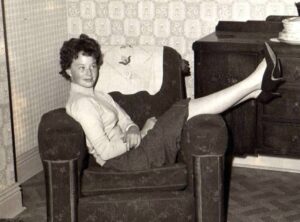
Beth as a teenager in the 1950s.
You mention you’re lucky to have survived these illnesses without significant long-term disabilities. Do you know of other people who weren’t as fortunate?
Yes, there’s two members of the family that I know of. One got mumps when he was in his twenties and became sterile. And then there was somebody who married into the family and her first child had a hearing impairment because she had German measles (rubella) at the time when the fetus was developing its hearing. The child had to have a deaf education.
When I worked as a schoolteacher in London, we had a class of children with disabilities. They were all children of teachers who had these illnesses, particularly German measles, and their hearing mostly was affected. At the time, you just got these childhood illnesses and had to be lucky and live through them. Lots of people lived with what they called “little problems.” If you had mitral valve damage (problem with a part of the heart that affects blood flow), you just weren’t as active as everyone else. It was hard.
Your first vaccination was for smallpox. Do you remember getting vaccinated for the first time? What was it like?
When I was a child, the only vaccination I could get was for smallpox. There was a lot of shrieking because it was quite painful. They cut your arm, and I remember yelling because I didn’t expect it. I must’ve been quite young—probably about three. I still have a scar where I got vaccinated.
My father was adamant I got vaccinated for smallpox but for the other illnesses, there were no vaccinations. He was always very worried about polio.
When you were a child, there was no vaccine for polio yet. Do you remember when the polio vaccine became available?
I think I had my first polio vaccination when I came to the United States. It was an oral vaccine. I remember thinking, “Good, now I won’t get polio.”
Polio was horrible, and very deadly to some people. The most extreme cases had to live in an iron lung and others had severe problems with their legs and could barely walk.
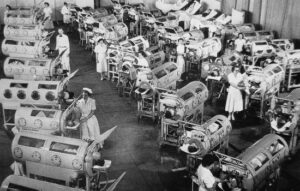
Image of iron lungs for polio patients from Science Museum.
You experienced several diseases as a child that are now preventable through vaccines. Does that motivate you to stay up to date on vaccines as an older adult?
Yes, it does. It’s so simple to get a vaccination and then, if nothing else, the illness when you meet it is probably lessened by the fact that you were vaccinated.
What do you want other people to know about vaccine-preventable diseases? What advice would you give them if they don’t think vaccines are important?
It’s horrible to get these illnesses and then get complications that may affect the whole of your life, or you might even die. It’s so simple to get a vaccination and not only are you safe, but so is society.
Additional Resources
Want to share why you get vaccinated? Tell your story here.
VYF provides up-to-date information on vaccine safety and access on our website. View our current programs to learn more about our services and ways to get involved.
For more information: